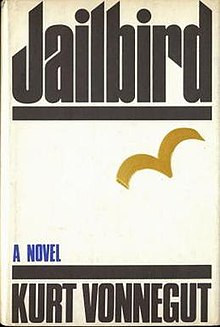Jailbird (novel)
 Cover of first edition (hardcover) | |
| Author | Kurt Vonnegut |
|---|---|
| Language | English |
| Genre | Novel |
| Publisher | Delacorte Press |
Publication date | 1979 |
| Publication place | United States |
| Media type | Print (hardcover and paperback) |
| Pages | 268 |
| ISBN | 0-385-28627-9 |
| OCLC | 233790605 |
Jailbird is a novel by American author Kurt Vonnegut, published in 1979 by Delacorte Press.[1] The novel is often described as Vonnegut's "Watergate novel," as it explores themes related to the Watergate scandal, the American labor movement, and the political landscape of the United States during the mid-20th century.[2]
Plot summary
[edit]The novel is narrated by Walter F. Starbuck, a minor player in the Watergate Scandal, who has just been released from a minimum-security prison in Georgia. The story unfolds as a memoir, with Starbuck recounting his experiences immediately following his release from prison. The narrative delves into his past, his involvement in the scandal, and his reflections on the American labor movement, corporate America, and the socio-political events of the time.[3]
Throughout Jailbird, Vonnegut uses the character of Starbuck to explore themes of guilt, redemption, and the complexities of American history. The novel is notable for its satirical tone and its critique of the American political and economic systems.
Recurring characters
[edit]Jailbird features a cameo by Kilgore Trout, a recurring character in Vonnegut's works. In this novel, Trout is portrayed differently than in other books, as he is revealed to be a pseudonym for a character in prison, which deliberately contradicts the autobiographical details of Trout's life in other Vonnegut novels. This serves as an example of Vonnegut's use of the unreliable narrator device.
Literary significance and reception
[edit]The New York Times Book Review referred to Jailbird as Vonnegut's "Sermon on the Mount."[4] Kirkus Reviews described the novel as "[n]ot top-drawer Vonnegut...but...there's enough of the author's narrative zip to keep fans happy even while the novel fizzles into foolishness."[5]
In a 2013 article, Jacobin magazine called Jailbird Vonnegut's "most extensive exploration of labor" and "Vonnegut's clearest articulation of sympathies with the labor movement."[6] Vonnegut himself gave the novel a grade of "A" when he graded all of his published works in his collection Palm Sunday.[7]
References
[edit]- ^ Wolcott, James (November 22, 1979). "Mod Apostle". The New York Review of Books. Vol. 26, no. 18 – via www.nybooks.com.
- ^ Allen, William Rodney (December 26, 2013). "Kurt Vonnegut on Jailbird, His Watergate Novel". WNYC.org. Retrieved March 22, 2015.
- ^ Freese, Peter (1999). "Kurt Vonnegut's "Jailbird": Recent American History and the Failure of the American Dream". Amerikastudien / American Studies. 44 (1): 137–165. JSTOR 41157440.
- ^ Leonard, John (September 7, 1979). "Books of The Times". The New York Times. Retrieved March 22, 2015.
- ^ "JAILBIRD Kirkus Reviews" – via www.kirkusreviews.com.
- ^ Gannon/Taylor, Matthew/Wilson. "Vonnegut and Labor". Jacobin.
- ^ ""Grading Vonnegut's Novels (and Assorted Other Works)"". Kurt Vonnegut Museum and Library. Retrieved January 5, 2022.
